#British playhouse
Text
Gerasim Lebedev and His Daring Experimental Playhouse
Gerasim Stepanovich Lebedev, 1749-1817. Courtesy Beyond Russia
OBJECTIVES
Here, in this essay, I will restrict the scope of my discussions to the experimental playhouse Grasim Lebedev founded in 1795 under the banner “Bengally Theatre”. The playhouse was alive only for two gala nights within a range of three months before it was lost into fragments of historical irrelevance. I intend to restore…
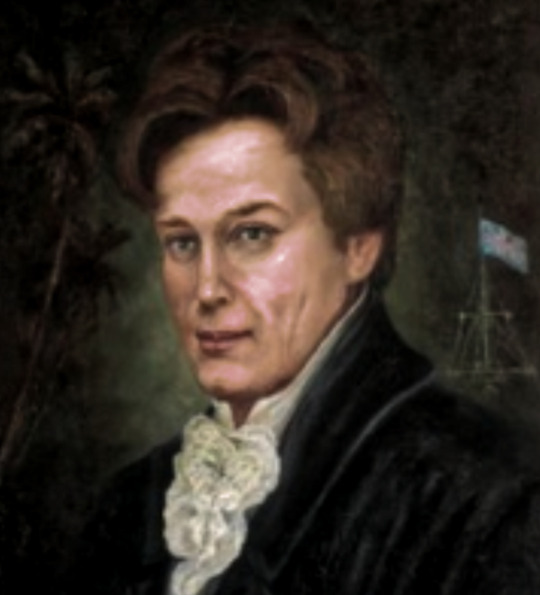
View On WordPress
#Adhikari#Afanasy Nikitin#কাল্পনিক সং বদল#Bazaar Hindustani#Beethoven#Bengal Renaissance#Bengali dictionaries#bengali grammars#Bengallie School Master#Bengally Theatre#Bharat Chandra Roy#Bow Street#Brahmin#British playhouse#Brotherhood#Bundookwalla-ka-gully Bentinck Street#calcutta#calcutta theatre#cello player#Colonel Alexander Kyd#Cooper and Upjohn#Czarist Russia#Doomtullah Street#East India Company#English Orientalists#Esquire#Europe#Father of Bengali theatre#Fire Temple#Francis Gladwin
1 note
·
View note
Text

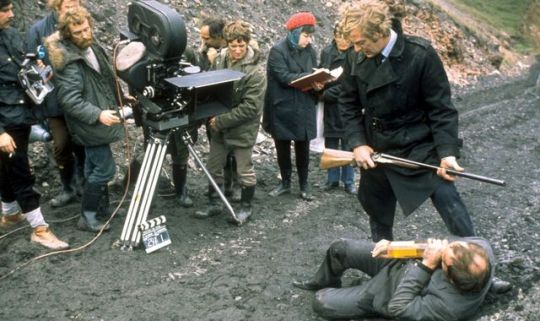

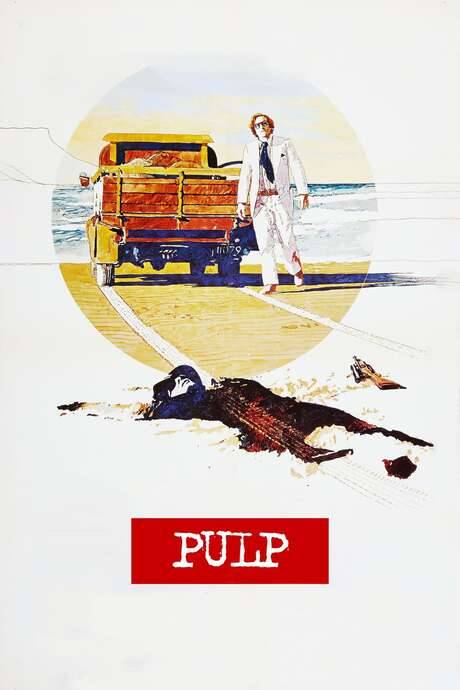

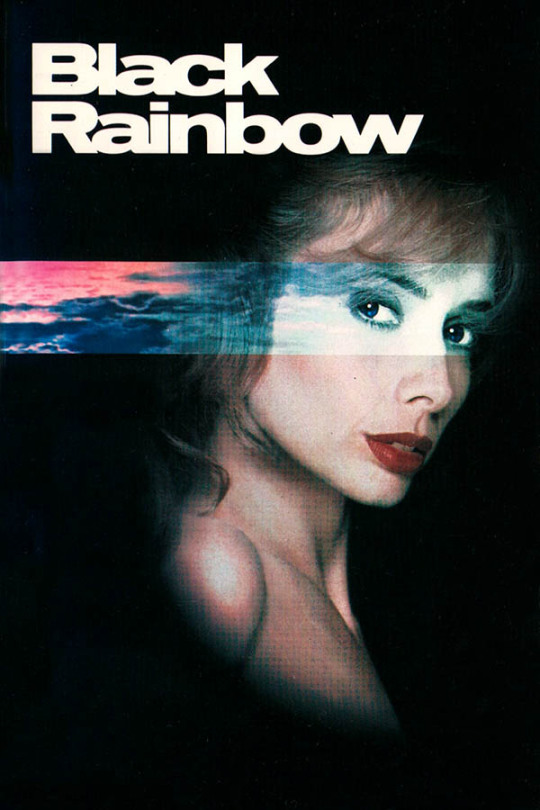
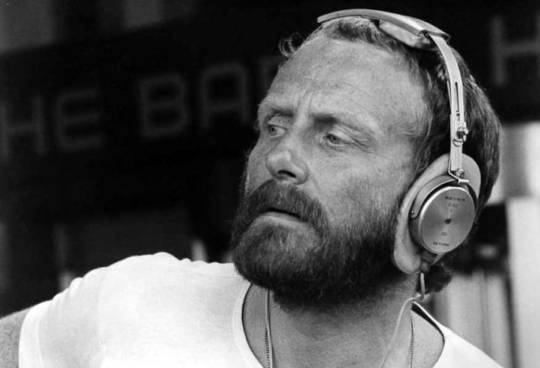
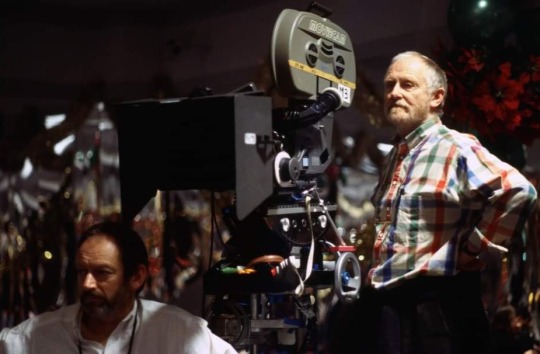
RIP Mike Hodges (29.7.1932 - 17.12.2022)
"A film is alive. You shouldn't stifle it. You should never over art-direct, over conceive, over research, or walk in with an exact idea of how things should be done."
#mike hodges#rip#death ment tw#film director#get carter#pulp#the terminal man#flash gordon#damien: omen ii#black rainbow#croupier#a prayer for the dying#I'll sleep when I'm dead#the tyrant king#itv playhouse#rumour#suspect#and so farewell to one of the last great british writer directors of his generation#Mike's filmography may be slender by comparison to many of his contemporaries#but for get carter alone he should be considered one of the greats#add in the much under appreciated Pulp and Black Rainbow (and yes Flash Gordon too)#and you have an artist of notable talent and style whose work (often interfered with by studios that couldn't accept his vision) stands#among the best british filmmaking of the era. his itv play Rumour‚ which was thankfully included on the Armchair Cinema boxset as a special#feature (it was in many ways a dry run for what Euston films were hoping to achieve with the subsequent series of one offs)#is one of the single dramas that has most thoroughly stuck in my mind years later and which has to be seen and experienced by anyone#interested in old tv. i wrote to mike as a kid and received a kind response and a signed photo which hung on my wall for many years#he was i believe in post production on a documentary film about his life and career and i hope that it was sufficiently completed to be#released soon. it seems a suitable tribute to a man who sat awkwardly within the cinema machine of big studios and shooting to instruction:#to end by telling his own story as he wanted to tell it
7 notes
·
View notes
Text
welcome to my blog! :3


hiii!! I'm berry :> aroace nb lesbian & autistic! born 2005 'n my pronouns are they/them (swedish pronouns: hen/hens) my blog is dedicated to my special interests which currently are mlp & invader zim!👽 this blog is also somewhat an agere blog, I age regress due to c-ptsd
links:
sideblog just for funsies @twilishysparkle !! 💗
my yt channel! (mostly mlp & dub stuff)
I like to post fanart I make and just about whatever else that has with my interests to do! If u wanna look at my art, I use the tags: #my art! ☆ #my pony art ☆ #my iz art ☆
I'm half swedish & half british and swedish dubbing is a huge interest of mine, especially the dub for mlp:fim I tag posts about dubbing with: #dub stuff & posts specific to the swedish dub of fim with it's title: #my little pony: vänskap är magiskt
Send me asks about whatever (especially if they're about mlp dub stuff), I love talking about my interests! just keep it sfw and please refer from swearing.
I don't do commissions but u can request stuff if you want. Just remember I'll only make it if I have time and feel like it, don't get upset if I don't make it.
U can message me if u wanna be friends! Just keep in mind i have trouble responding sometimes & understanding sarcasm & certain jokes so try to be patient ☆ due to my c-ptsd i can't start conversations (even if we've talked before) (this is something I want to work on of course but currently I struggle a lot) So if we haven't talked in a while just send me a hi or a gif or whatever that way I know I'm safe and that you want to talk to me.
some other tags i use:
#reblog ☆
#art by others (#mlp art by others , #iz art by others etc.)
#☆.mp4
#☆.mp3
#☆.txt
#☆.asks
#☆.gif
#icons
#berry talks about stuff
#mlp toys
A few other things I like :>
☆ she-ra and the princesses of power ☆
☆ baking ☆
☆ colouring/crafting ☆
☆ playing with toys & plushies ☆
☆ djungeldjuret/jungledyret hugo ☆
☆ barbie movies 🎀📀 ☆
☆ bluey and other playhouse disney/ disney junior programs ☆
☆ winnie the pooh ☆
☆ disney’s frozen ☆
☆ the smurfs ☆
☆ strawberry shortcake ☆
#new pinned! :> 'cause the old one was straight-up broken and I couldn't edit it lol#i'll update the playlist later when I have time :3#mlp fandom#invader zim fandom
22 notes
·
View notes
Text
Fay Browning: British Actress known for The Love Factor (1969) and ITV Playhouse (1967).
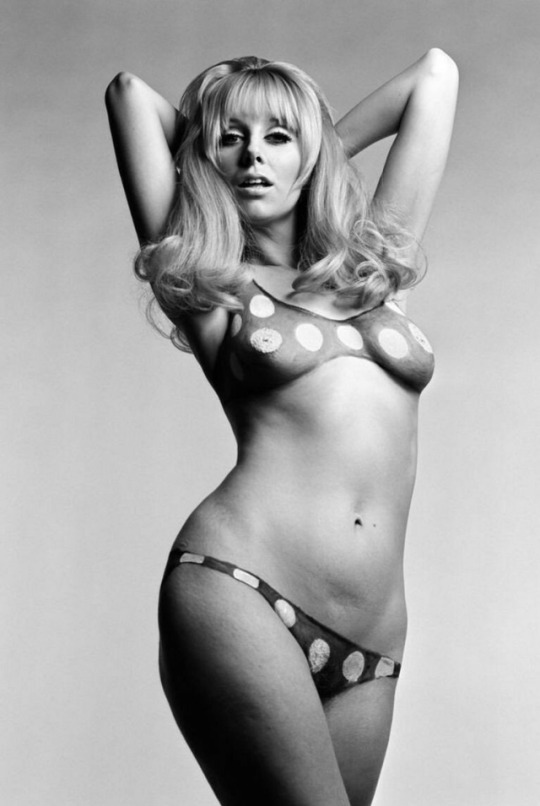
#fay browning#1960s#1967#uk#actress#raised arms#armpits#two piece bathing suit#bathing suit#bikini#polka dots#polka dot bikini#beautiful hair#beautiful#favorite#1969
250 notes
·
View notes
Text
Another Pyro-era Sounds article for your delectation (text under the cut)
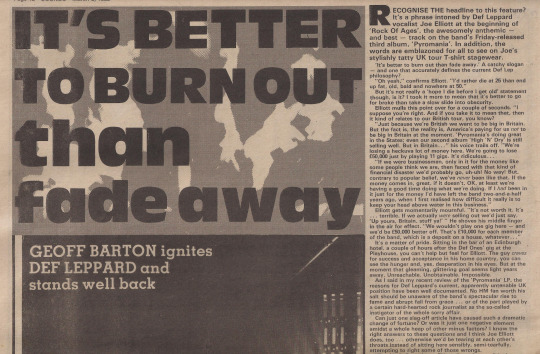
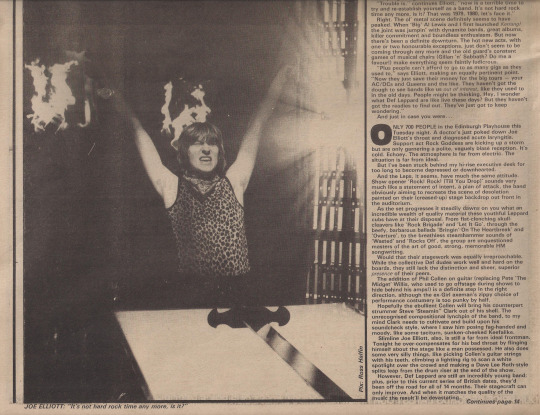
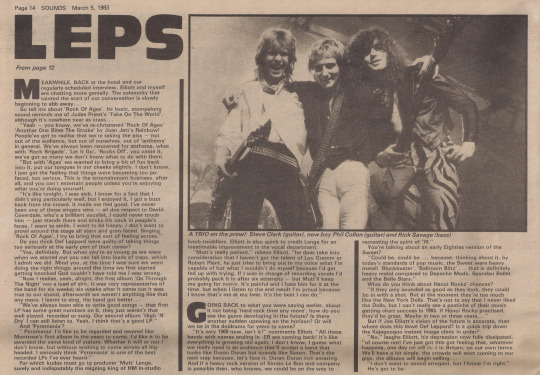
IT'S BETTER TO BURNOUT than fade away
GEOFF BARTON ignites DEF LEPPARD and stands well back
RECOGNISE THE headline to this feature? It's a phrase intoned by Def Leppard vocalist Joe Elliott at the beginning of 'Rock Of Ages', the awesomely anthemic and best track on the band's Friday-released third album, 'Pyromania'. In addition, the words are emblazoned for all to see on Joe's stylishly tatty UK tour T-shirt stagewear.
'It's better to burn out than fade away. A catchy slogan - and one that accurately defines the current Def Lep philosophy?
"Oh yeah." confirms Elliott. "I'd rather die at 25 than end up fat, old, bald and nowhere at 50."
But it's not really a 'hope I die before I get old' statement though, is it? I took it more to mean that it's better to go for broke than take a slow slide into obscurity.
Elliott mulls this point over for a couple of seconds. "I suppose you're right. And if you take it to to mean that, then it kind of relates our British tour, you know?
"Just because we're British we want to be big in Britain. But the fact is, the reality is, America's paying for us not to be big in Britain at the moment. 'Pyromania's doing great in the States; even our second album 'High 'N' Dry' is still selling well. But in Britain his voice trails off. "We're losing a heckuva lot of money here. We're going to lose £50,000 just by playing 11 gigs. It's ridiculous..."
"If we were businessmen, only in it for the money like some people think we are, then faced with that kind of financial disaster we'd probably go, uh-uhl No way! But, contrary to popular belief, we've never been like that. If the money comes in, great, if it doesn't, OK, at least we're having a good time doing what we're doing. If I had been in it just for the money I'd have left the band two-and-a-half years ago, when I first realised how difficult it really is to keep your head above water In this business."
Elliott gets momentarily mournful. "It's not worth it. It's terrible. If we actually were selling out we'd just say, 'Up yours, Britain, stuff ya!" He shoves his middle finger In the air for effect. "We wouldn't play one gig here and we'd be £50,000 better off. That's £10,000 for each member of the band, which is a deposit on a house, whatever..."
It's a matter of pride." Sitting in the bar of an Edinburgh hotel, a couple of hours after the Def Ones' gig at the Playhouse, you can't help but feel for Elliott. The guy craves for success and acceptance in his home country, you can see the hunger and, yes, desperation in his eyes. But at the moment that gleaming, glittering goal seems light years away. Unreachable. Unobtainable. Impossible.
As I said in my recent review of the 'Pyromania' LP, the reasons for Def Leppard's current, apparently untenable UK position have been well documented. No HM fan worth his salt should be unaware of the band's spectacular rise to fame and abrupt fall from grace or of the part played by a certain hard-hearted rock journalist as the so-called instigator of the whole sorry affair.
Can just one slag-off article have caused such a dramatic change of fortune? Or was it just one negative element amidst a whole heap of other minus factors? I know the right answers to these questions and I think Joe Elliott does too, otherwise we'd be tearing at each other's throats instead of sitting here sensibly, semi-tearfully,
attempting to right some of those wrongs.
"Trouble is," continues Elliott, "now is a terrible time to try and re-establish yourself as a band. It's not hard rock time any more, is it? That was 1979, 1980, let's face it."
Right. The ol' metal scene definitely seems to have peaked. When 'Big Al Lewis and I first launched Kerrang! the joint was jumpin' with dynamite bands, great albums, killer commitment and boundless enthusiasm. But now there's been a definite downturn. The hot new acts, with one or two honourable exceptions. just don't seem to be coming through any more and the old guard's constant games of musical chairs (Gillan 'n' Sabbath? Do me a favour!!) make everything seen faintly ludicrous.
"Plus people can't afford to go to as many gigs as they used to," says Elliott, making an equally pertinent point."
"Now they just save their money for the big tours your AC/DCs and Queens and the like. They haven't got the dough to see bands like us out of interest, like they used to in the old days. People might be thinking, Hey. I wonder what Def Leppard are like live these days? But they haven't got the readies to find out. They've just got to keep wondering.
And just in case you were.
ONLY 700 People in the Edinburgh Playhouse this Tuesday night. A doctor's just poked down Joe Elliott's throat and diagnosed acute laryngitis.
Support act Rock Goddess are kicking up a storm but are only garnering a polite, vaguely blase reception. It's cold. Echoey. The atmosphere is far from electric. The situation is far from ideal.
But I've I've been stuck behind my hi-rise executive desk for too long to become depressed or downhearted.
And the Leps, it seems, have much the same attitude. Show opener 'Rock! Rock! (Till You Drop) sounds very much like a statement of intent, a plan of attack, the band obviously aiming to recreate the scene of desolation painted on their (creased-up) stage backdrop out front in the auditorium.
As the set progresses it steadily dawns on you what an incredible wealth of quality material these youthful Leppard cubs have at their disposal. From fist-clenching skull- cleavers like 'Rock Brigade' and 'Let It Go', through the cleavers like Rock beefy, barbarous ballads 'Bringin' On The Heartbreak' and 'Overture', to the breathless steamhammer sounds of 'Wasted' and 'Rocks Off', the group are unquestioned masters of the art of good, strong, memorable HM songwriting.
Would that their stagework was equally irreproachable. While the collective Def dudes work well and hard on the boards, they still lack the distinction and sheer, superior presence of their peers.
The addition of Phil Collen on guitar (replacing Pete The Midget Willis, who used to go offstage during shows to hide behind his amps) is a definite step in the right direction, although the ex-Girl axeman's zippy choice of performance costumery is too punky by half.
Hopefully the ebullient Collen will bring his counterpart strummer Steve 'Steamin" Clark out of his shell. The unrecognised compositional lynchpin of the band, to my mind Clark needs to cultivate and build upon his soundcheck style, where I saw him posing fag-handed and moody, like some taciturn, sunken-cheeked Keefalike.
Slimline Joe Elliott, also, is still a far from ideal frontman. Tonight he over-compensates for his bad throat by flinging himself about the stage like a man possessed. He also does some very silly things, like picking Collen's guitar strings with his teeth, climbing a lighting rig to shine a white spotlight over the crowd and making a Dave Lee Roth-style splits leap from the drum riser at the end of the show.
However, Def Leppard are still an incredibly young band; plus, prior to this current series of British dates, they'd been off the road for all of 14 months. Their stagecraft can only improve. And when it matches the quality of the music the result'll music be devastating
MEANWHILE, back at the hotel and our regularly-scheduled interview. Elliott and myself are chatting more genially. The solemnity that tainted the start of our conversation is slowly beginning to ebb away..
So tell me about 'Rock Of Ages'. Its basic, stompalong sound reminds me of Judas Priest's "Take On The World', although it's nowhere near as crass..
"Yeah you know, we've re-christened 'Rock Of Ages' Another One Bites The Stroke' by Joan Jett's Rainbow! People've got to realise that we're taking the piss not out of the audience, but out of ourselves, out of 'anthems' in general. We've always been renowned for anthems, what with 'Rock Brigade', 'Let It Go', 'Rocks Off', you name it, we've got so many we don't know what to do with them. But with 'Ages' we wanted to bring a bit of fun back into it, put our tongues in our cheeks slightly. I don't know, I just got the feeling that things were were becoming too po-faced, too serious. This is the entertainment business, after all, and you can't entertain people unless you're enjoying what you're doing yourself."
"It's like tonight. I was sick. I know for a fact that I didn't sing particularly well, but I enjoyed it. I got a buzz back from the crowd, it made feel good. I've never been one of those singers who, all due respect to David Coverdale, who's a brilliant vocalist, I could never touch - just stands there and sticks his cock in people's faces. I want to smile, I want to be happy, I don't want to prowl around the stage all stern and grim-faced. Singing 'Rock Of Ages', I try to bring that sort of feeling across." Do you think Def Leppard were guilty of taking things too seriously at the early part of their career?
'Yes, definitely. But when you're as young as we were when we started out you can fall into loads of traps, which I admit we did. Mind you, at the time I was sure we were doing the right things; around the time we first started getting knocked God couldn't have told me I was wrong.
"Now I realise, yeah, alright, the first album 'On Through The Night' was a load of shit. It was very representative of the band for six weeks; six weeks after it came out it was true to our sound, afterwards we weren't anything like that any more. I learnt to sing, the band got better..."
"We've always been able to write good songs that first LP has some great numbers on it, they just weren't that well played, recorded or sung. Our second album 'High 'N' Dry' I can still listen to. Yeah, I think that's a good LP.
And 'Pyromania'?
'Pyromania' I'd like to be regarded and revered like Montrose's first album in the years to come. I'd like it to be awarded the same kind of stature. Whether it will or not don't know, but without wishing to come across all big headed. I seriously think 'Pyromania' is one of the best recorded LPs I've ever heard
For which kudos must go to producer 'Mutt' Lange.. surely and indisputably the reigning king of HM in-studio knob-twiddlers. Elliott is also quick to quick to credit Lange for an inestimable improvement in the vocal department.
"Mutt's really patient" relates Elliott. "he does take into consideration that I haven't got the talent of Lou Gramm or Robert Plant, he just tries to bring out in my voice what I'm capable of but what I wouldn't do myself because I'd get fed up with trying. If I was in charge of recording vocals I'd probably pack it in after six attempts but Mutt'll keep me going for twelve, It's painful and I hate him for it at the time. but when I listen to the end result I'm proud because know that's me at my best. It's the best I can do.
GOING back to what you were saying earlier, about it not being hard rock time any more, how do you see the genre developing in the future? Is there another sudden upswing on the horizon? Or will we be in the doldrums for years to come?
"It's very 1969 now, isn't it?" comments Elliott. "All these bands with names ending in -ER are are coming back! It's like everything is growing old again. I don't know. I guess what we really need is an audience that'll accept a band that looks like Duran Duran but sounds like Saxon. That's the next step because, let's face it, Duran Duran look amazing. And if a heavy rock version of Simon Le Bon and company is possible then, who knows, could be on the way to recreating the spirit of "74,"
You're talking about an early Eighties version of the Sweet?
"Could be, could be... because, thinking about it, by today's standards of pop music, the Sweet were heavy metal! 'Blockbuster. 'Ballroom Blitz... that is definitely heavy metal compared to Depeche Mode, Spandau Ballet and the Belle Stars."
What do you think about Hanoi Rocks' chances?
"If they only sounded as good as they look, they could be in with a shot. But at the moment they're too much like the New York Dolls. That's not to say that I never liked the Dolls, but I can't really see a pastiche of their music getting chart success in 1983. If Hanol Rocks practised, they'd be great. Maybe in two or three years...
But if Joe Elliott's vision of the future is accurate, then where does this leave Def Leppard? Is a quick trip down the Kajagoogoo instant image clinic in order?
"No," laughs Elliott, his depression now fully dissipated, "of course not! I've just got this gut feeling that, whatever happens, one day we will do it in Britain, on our own terms. We'll have a hit single, the crowds will start coming to gigs, the albums will begin selling..."
"I don't want to sound arrogant, but I I know I'm right."
He's got to be.
#def leppard#magazine scan#i was also amused by the advert for the album on the next page at the price of £3.99#given what i just paid for the new 5 disc set
18 notes
·
View notes
Text
Radio, Radio!
I almost didn’t write this post for fear that you guys will think I’m even more of an old than I even am, but a) fuck it and b) there’s a way in which everything old is new again, so bear with me. *takes deep breath* OK, so when I was a young fan, a lot of my fannish life happened over the RADIO. Yes, RADIO, that–I was about to say, that weird looking box with dials on it, but you probably don’t even have a radio. (*Shut up, shut up, I can’t hear you, la la I am going to live forever!*) But you probably listen to something like radio on Spotify, or you listen to podcasts, or you might even use an app to listen to some great legacy radio station in your area. So imagine you had a dedicated box just for that.

Anyway, in the before-times, radio then–like podcasts now–was a way to do fandom. Music people know this of course, but I’m both a fan and a theatre person, and man, radio theatre was the best, and fannish radio theatre even better. Britain had and still has a really strong radio drama tradition, which is smart because it lets them produce new plays by new writers for a fraction of the cost of a staged production. But NPR in the US used to do radio drama too–they had a show called NPR Playhouse / Sounds of Theatre which I was devoted to.
I have two particularly strong fannish memories from this era. First, the joy of hearing the original Hitchhiker’s Guide to the Galaxy on radio. Douglas Adams wrote Hitchhikers for radio and radio is the best way to experience it - I mean, Zaphod having two heads and three arms is radio joke if there ever was one, and then all these poor TV and film people had to figure out how to actually get an actor with a second head. (Footnote 1). I backtrack here to say that if you don’t know what I’m talking about, never read or saw any version of The Hitchhiker’s Guide to The Galaxy, click on the link and have yourself a whale of a time (or a bowl of petunias of a time.) (Sorry, the whole Hitchhiker’s thing makes me instantly 12 years old FOREVER. My whole world is Hitchhikers, Star Wars, and Doctor Who– Five.)
Moving on: the second great fannish radio experience was NPR’s dramatized version of Star Wars, which had Mark Hamill and Anthony Daniels playing their original roles, and Perry King as Han Solo - Perry King, you will remember (who am I kidding, you will absolutely not remember, but anyway), became a fan-favorite for a show called Riptide, so that was okay, too. And they expanded the text! And added new scenes! I can remember Mark Hamill giving an interview talking about how different it was to play the part for radio; he talked about how you had to sort of put movement in your voice at all times: “I’m–grunt–putting on my–harumph–jacket!” But he was great at it–obviously, since he’s become such a famous voice actor since. And it’s wonderful that podcasting has brought theatre and fandom back into the medium of sound - podcasts are the obvious new media version of all this.
Okay, so bring this back to fan studies, these personal fannish reminiscences (and awesome links—you’re welcome!) are brought to you by Martin Cooper’s book Radio Legacy in Popular Culture: The Sounds of British Broadcasting Over the Decades (Bloombury, 2022, excerpt available at the link). Make no mistake, this is a fannish book in its way - Cooper is interested not just in radio but in artistic works that are in some way about radio, which he regards explicitly as fanworks about radio:
In the case of fandom it could be alternative storylines; in our case of radio listening, it can be a reinterpretation of what has been heard on the airwaves. Hence, it is plausible to think of the responses I analyse in the chapters that follow as reinterpretations and critiques of radio listening; that they have been produced by professional writers and musicians makes them less of a subculture and more of a series of transformative texts that extend the meaning and understanding of the medium of radio. They are portrayals of the everyday action of listening to the radio: of paying attention to the programmes, the discussions, the documentaries, the dramas, the daily shows and the DJs.
Note that the book has a specifically British focus, but British music and drama have influenced fandoms all over the world. I mean, Radio, Radio; Video Killed The Radio Star; Oh Yeah (There’s a Band Playing On The Radio), Radio Clash –Cooper frames all these songs as part of a British transformative fannish response to the medium. Radio on!
–Francesca Coppa, fanhackers volunteer
(1) I got the chance to meet Mark Wing-Davey, who played Zaphod Beeblebrox both on the original radio show and on the BBC show--he's a big-shot theatre director now, but I honestly could not keep my inner 12 year old under control: I basically had my fists stuffed in my mouth because OMG Zaphod Beeblebrox!!! my heart!! and finally I just kind of choked out, "sorry, I can't--excuse me" and fled the dinner. *facepalm*
38 notes
·
View notes
Text
Groundhog Day at the Old Vic, London 2023
*dusts off the old blog*
It's certainly been a minute, hasn't it! Still here, still a huge GHD fan. In the intervening years, I got to see productions at San Francisco Playhouse and at the Paramount Theatre in Aurora, IL. (I also got married and went through a bunch of other life stuff, but that's neither here nor there).
But then it was announced that Groudhog Day would be returning to the Old Vic in 2023 with Andy Karl, and my husband and I used that as an excuse to finally do that UK trip we'd been talking about for years.
Tumblr user colemckenzies did a great post outlining some of the changes between Broadway and 2023 Old Vic. I wanted to further elaborate on some additional changes I noticed. Obviously spoilers to follow:
In “There Will Be Sun”, the first chorus of “Tomorrow spring will come and then there will be blue skies my friend” is cut. It goes straight from “If not tomorrow then tomorrow or tomorrow there will be sun” to “Oh if I could I’d will these clouds away my love”
While obviously the revolves are gone (look at me picking up British-isms 😄), the bedroom set gets wheeled in every loop. They keep the trick from Broadway where this is always done counter-clockwise until the loop finally breaks.
As previously mentioned, there’s a wonderful lyric change in Day One. “Their dumb superstitions and vacuous chat, their total unawareness of the fact their trapped, perhaps you don't miss it if you don't know you lack it, I'm sure there was a pack of xanax in this jacket'
I adore this because of the foreshadowing, and how Phil thinks he’s singing about the townsfolk when he’s really singing about himself.
Dialogue change in 2023 when Phil runs into Jonathan:
Jonathan: “Off to the see the groundhog?”
Phil: “Why, isn’t there a tractor pull or a cow-tipping contest?”
Jonathan, looks confused: “I don’t think that’s today.”
When Rita introduces to Phil on Day One and reminds him of the flood story, Phil takes a second before recalling, groans, and goes, "Oh, the intern? They didn't even send me a real producer." After which Rita corrects him that she's a real producer now, albeit an associate producer.
On Day 2 when the sheriff drops his gun, Phil asks "How do you have a permit???"
At the end of Day 2, Rita sings “I mean he acts kind of asshole-ish still. I think he might be mentally ill.” While it’s on the cast recording and the early previews bootleg, I could have sworn it was cut in the final Broadway version. Regardless, it’s restored in the 2023 version.
Phil’s “Help me~~~~” at the end of Day 3 is cut.
In Philandering, they cut the line where Phil "proposes" to Nancy (which I prefer - no one is that stupid, and they make the point later that Nancy is more than a caricature)
Also in Philandering, you can hear the chorus singing, “Gonna party like it’s no tomorrow~~~” in the party scene (formerly the orgy scene). Phil also gets 10 pizzas delivered to his room.
Phil is less aggressive when he confesses his “love” to Rita in One Day.
On Broadway, they sit down directly on the stage, and Phil leans sideways to Rita to confess. As he gets more desperate, he starts to position himself over her and tries to take her hand, after which she slaps him.
In 2023, they’re sitting on a bench together. Phil tries to take her hand, and she pulls away and slaps him. Still creepy, but much less heading in the direction of sexual assault.
Either way Phil totally deserves to get slapped. I’ve talked to a few people who have said they could never root for Phil because of this scene (which is a fair critique). The 2023 version IMO makes the same point without so much portraying Phil as a potential sexual predator.
Right before Phil smashes the alarm clock at the end of One Day, he yells “Make it stop!” (“Somebody make it stop”? Memory is a fickle thing)
When Phil kills himself with the gun before Hope, it's more explicit that he stole the gun off of the sheriff with his faulty holster.
I don't remember if this is new, but when Phil wakes up at the beginning of Hope, he touches the side of his head where he shot himself and even though he knows that the day will always reset, he still looks a little surprised and it's heartbreaking.
For the third death/revival in Hope (where Phil climbs the ladder):
Broadway: Phil reappears in bed
Old Vic 2023: Phil reappears on the scene of the broadcast, fully dressed
As noted, lots of changes to If I Had My Time Again.
Cast recording: "The thing with these revolving rides / they're only fun because you know they're going to end"
Broadway (as of early in previews): "I was completely dead inside / But today I'm like 85%"
London 2023: We're back to the cast recording lyrics.
IMO the orchestration and lyric changes are for the better. I adored this song on the cast recording, but in the August Wilson theater it frequently felt swallowed up.
With the emphasis on just Phil and Rita, it’s a much more intimate song, which is what the scene needs IMO.
I also love Rita’s new lyric “Go to all the parties that I missed / Kiss all the boys I was too afraid to kiss”, because then it’s Rita fulfilling her “time again” when she kisses Phil during Seeing You.
After "If I Had My Time Again", Phil eats a carton of Ben & Jerry's while discussing the almanac with Rita. I love the implication that he’s eaten all of this junk food before, but he’s trying it again with her.
Dialogue change after "If I Had My Time Again"
Phil: "You know, Larry, we never really talk."
Broadway Larry: "Sometimes I think you don't notice that I'm there."
London 2023 Larry: "Well you never brought me donuts before."
Not a change, but I was sitting close enough one night to see the stock photos they use for Ned’s wallet pictures of his kids, and I realized that “little Mary” is just a baby. It really hit home that Ned has probably just lost his wife in the last year or two, and he’s trying to raise five very young kids on his own.
In the Broadway/cast recording versions of "Philanthropy", you can hear some melodic callbacks to earlier songs. In the London 2023 version, the chorus actually sings lines like, "I'm not sure what the point is / But this point is it don't matter" and "If I had my time again I would not do it all the same"
There's no pause of silence before "Seeing You" starts
After Phil and Rita run off into the snow at the end of Seeing You, the couples left dancing are Nancy/Larry, Debbie/Fred, and then Mrs. Lancaster dances alone in the snow in joyous wonder. I love this bit, becuase it feels like all the different ways you can find a new meaning of love (Nancy/Larry, the couple just discovering each other, Debbie/Fred, who have moved into a new phase of their relationship, and then Mrs. Lancaster, who even as an old woman can revel in the beauty of the snow)
In 2023 when Phil takes Rita to see the sunrise, he makes her cover her eyes, and then unveil them once the full sunrise is in view. It’s very sweet.
Anyway, I love this show, and I love talking about this show, so please feel free to hit me up! I may post more general thoughts, etc. if anyone is interested.
#andy karl#groundhog day musical#groundhog day the musical#groundhog day#phil connors#rita hanson#old vic#ghd musical
50 notes
·
View notes
Text
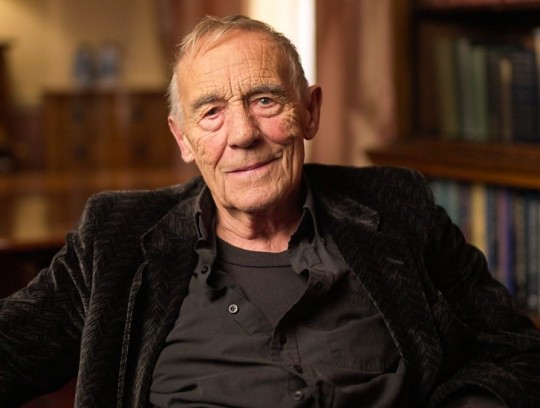
The actor Michael Jayston, who has died aged 88, was a distinguished performer on stage and screen. The roles that made his name were as the doomed Tsar Nicholas II of Russia in Franklin Schaffner’s sumptuous account of the last days of the Romanovs in Nicholas and Alexandra (1971), and as Alec Guinness’s intelligence minder in John Le Carré’s Tinker Tailor Soldier Spy on television in 1979. He never made a song and dance about himself and perhaps as a consequence was not launched in Hollywood, as were many of his contemporaries.
Before these two parts, he had already played a key role in The Power Game on television and Henry Ireton, Cromwell’s son-in-law, in Ken Hughes’s fine Cromwell (1969), with Richard Harris in the title role and Guinness as King Charles I. And this followed five years with the Royal Shakespeare Company including a trip to Broadway in Harold Pinter’s The Homecoming, in which he replaced Michael Bryant as Teddy, the brother who returns to the US and leaves his wife in London to “take care of” his father and siblings.
Jayston, who was not flamboyantly good-looking but clearly and solidly attractive, with a steely, no-nonsense, demeanour and a steady, piercing gaze, could “do” the Pinter menace as well as anyone, and that cast – who also made the 1973 movie directed by Peter Hall – included Pinter’s then wife, Vivien Merchant, as well as Paul Rogers and Ian Holm.
Jayston had found a replacement family in the theatre. Born Michael James in Nottingham, he was the only child of Myfanwy (nee Llewelyn) and Vincent; his father died of pneumonia, following a serious accident on the rugby field, when Michael was one, and his mother died when he was a barely a teenager. He was then brought up by his grandmother and an uncle, and found himself involved in amateur theatre while doing national service in the army; he directed a production of The Happiest Days of Your Life.
He continued in amateur theatre while working for two years as a trainee accountant for the National Coal Board and in Nottingham fish market, before winning a scholarship, aged 23, to the Guildhall School of Music and Drama in London, where he was five years older than everyone else on his course. He played in rep in Bangor, Northern Ireland, and at the Salisbury Playhouse before joining the Bristol Old Vic for two seasons in 1963.
At the RSC from 1965, he enjoyed good roles – Oswald in Ghosts, Bertram in All’s Well That Ends Well, Laertes to David Warner’s Hamlet – and was Demetrius in Hall’s film of A Midsummer Night’s Dream (1968), with Warner as Lysander in a romantic foursome with Diana Rigg and Helen Mirren.
But his RSC associate status did not translate itself into the stardom of, say, Alan Howard, Warner, Judi Dench, Ian Richardson and others at the time. He was never fazed or underrated in this company, but his career proceeded in a somewhat nebulous fashion, and Nicholas and Alexandra, for all its success and ballyhoo, did not bring him offers from the US.
Instead, he played Charles Lutwidge Dodgson (Lewis Carroll) in Alice’s Adventures in Wonderland (1972), a so-so British musical film version with music and lyrics by John Barry and Don Black, with Michael Crawford as the White Rabbit and Peter Sellers the March Hare. In 1979 he was a colonel in Zulu Dawn, a historically explanatory prequel to the earlier smash hit Zulu.
As an actor he seemed not to be a glory-hunter. Instead, in the 1980s, he turned in stylish and well-received leading performances in Noël Coward’s Private Lives, at the Duchess, opposite Maria Aitken (1980); as Captain von Trapp in the first major London revival of The Sound of Music at the Apollo Victoria in 1981, opposite Petula Clark; and, best of all, as Mirabell, often a thankless role, in William Gaskill’s superb 1984 revival, at Chichester and the Haymarket, of The Way of the World, by William Congreve, opposite Maggie Smith as Millamant.
Nor was he averse to taking over the leading roles in plays such as Peter Shaffer’s Equus (1973) or Brian Friel’s Dancing at Lughnasa (1992), roles first occupied in London by Alec McCowen. He rejoined the National Theatre – he had been Gratiano with Laurence Olivier and Joan Plowright in The Merchant of Venice directed by Jonathan Miller in 1974 – to play a delightful Home Counties Ratty in the return of Alan Bennett’s blissful, Edwardian The Wind in the Willows in 1994.
On television, he was a favourite side-kick of David Jason in 13 episodes of David Nobbs’s A Bit of a Do (1989) – as the solicitor Neville Badger in a series of social functions and parties across West Yorkshire – and in four episodes of The Darling Buds of May (1992) as Ernest Bristow, the brewery owner. He appeared again with Jason in a 1996 episode of Only Fools and Horses.
He figured for the first time on fan sites when he appeared in the 1986 Doctor Who season The Trial of a Time Lord as Valeyard, the prosecuting counsel. In the new millennium he passed through both EastEnders and Coronation Street before bolstering the most lurid storyline of all in Emmerdale (2007-08): he was Donald de Souza, an unpleasant old cove who fell out with his family and invited his disaffected wife to push him off a cliff on the moors in his wheelchair, but died later of a heart attack.
By now living on the south coast, Jayston gravitated easily towards Chichester as a crusty old colonel – married to Wendy Craig – in Coward’s engaging early play Easy Virtue, in 1999, and, three years later, in 2002, as a hectored husband, called Hector, to Patricia Routledge’s dotty duchess in Timberlake Wertenbaker’s translation of Jean Anouilh’s Léocadia under the title Wild Orchids.
And then, in 2007, he exuded a tough spirituality as a confessor to David Suchet’s pragmatic pope-maker in The Last Confession, an old-fashioned but gripping Vatican thriller of financial and political finagling told in flashback. Roger Crane’s play transferred from Chichester to the Haymarket and toured abroad with a fine panoply of senior British actors, Jayston included.
After another collaboration with Jason, and Warner, in the television movie Albert’s Memorial (2009), a touching tale of old war-time buddies making sure one of them is buried on the German soil where first they met, and a theatre tour in Ronald Harwood’s musicians-in-retirement Quartet in 2010 with Susannah York, Gwen Taylor and Timothy West, he made occasional television appearances in Midsomer Murders, Doctors and Casualty. Last year he provided an introduction to a re-run of Tinker Tailor on BBC Four. He seemed always to be busy, available for all seasons.
As a keen cricketer (he also played darts and chess), Jayston was a member of the MCC and the Lord’s Taverners. After moving to Brighton, he became a member of Sussex county cricket club and played for Rottingdean, where he was also president.
His first two marriages – to the actor Lynn Farleigh in 1965 and the glass engraver Heather Sneddon in 1970 – ended in divorce. From his second marriage he had two sons, Tom and Ben, and a daughter, Li-an. In 1979 he married Ann Smithson, a nurse, and they had a son, Richard, and daughter, Katie.
🔔 Michael Jayston (Michael James), actor, born 29 October 1935; died 5 February 2024
Daily inspiration. Discover more photos at Just for Books…?
12 notes
·
View notes
Text
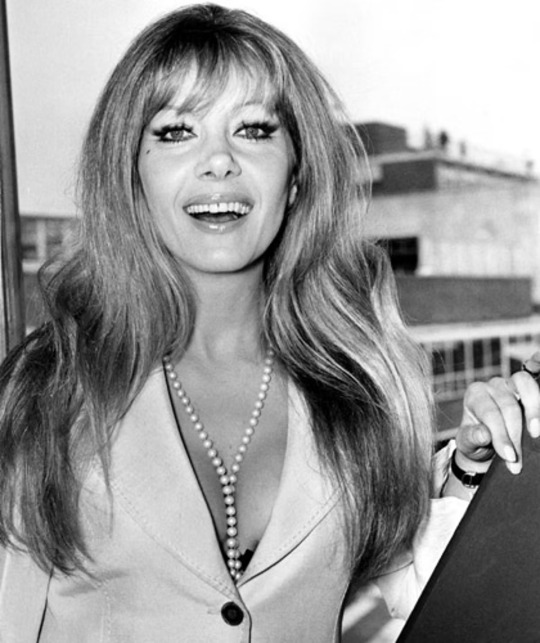
Celebrating Ingrid Pitt
Ingrid Pitt (born Ingoushka Petrov; 21 November 1937 – 23 November 2010) was a Polish-British actress and writer best known for her work in horror films of the 1970s.
Ingoushka Petrov was born in Warsaw, Poland, one of two daughters of a father of German Jewish descent and a Polish Jewish mother. During World War II, she and her mother were imprisoned in Stutthof concentration camp in Sztutowo, Free City of Danzig (present-day Nowy Dwór Gdański County, Pomeranian Voivodeship, Poland) but escaped. In Berlin, in the 1950s, Ingoushka married an American soldier, Laud Roland Pitt Jr., and moved to California. After her marriage failed she returned to Europe, but after a small role in a film, she took the shortened stage name "Ingrid Pitt", keeping her former husband's surname, and headed to Hollywood, where she worked as a waitress while trying to make a career in films.
In the early 1960s, Pitt was a member of the prestigious Berliner Ensemble, under the guidance of Bertolt Brecht's widow Helene Weigel. In 1965, she made her film debut in Doctor Zhivago, playing a minor role. In 1968, she co-starred in the low-budget science-fiction film The Omegans, and in the same year, played British spy Heidi Schmidt in Where Eagles Dare opposite Richard Burton and Clint Eastwood.
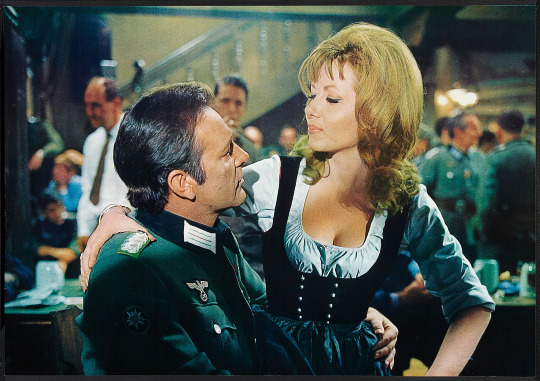
Her work with Hammer Film Productions elevated her to cult figure status. She starred as Carmilla/Mircalla in The Vampire Lovers (1970), based on Joseph Sheridan Le Fanu's novella Carmilla, and played the title role in Countess Dracula (1971), based on the legends about Countess Elizabeth Báthory. Pitt also appeared in the Amicus horror anthology film The House That Dripped Blood (1971) and had a small part in The Wicker Man (1973).

During the 1980s, Pitt returned to mainstream films and television. Her role as Fraulein Baum in the 1981 BBC Playhouse Unity, who is denounced as a Jew by Unity Mitford (Lesley-Anne Down), was uncomfortably close to her real-life experiences. Her popularity with horror film buffs had her in demand for guest appearances at horror conventions and film festivals. Other films in which Pitt has appeared outside the horror genre are: Who Dares Wins (1982) (or The Final Option), Wild Geese II (1985) and Hanna's War (1988). Generally cast as a villainess, her characters often died horribly at the end of the final reel. "Being the anti-hero is great – they are always roles you can get your teeth into."
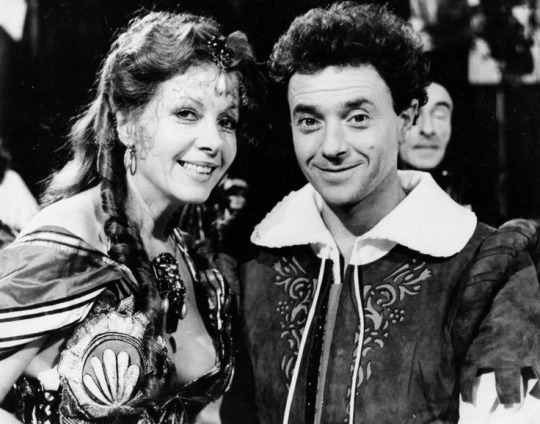
In the 1980s she also reinvented herself as a writer. Her first book, after a number of ill-fated tracts on the plight of Native Americans, was the 1980 novel, Cuckoo Run, a spy story about mistaken identity. "I took it to Cubby Broccoli. It was about a woman called Nina Dalton who is pursued across South America in the mistaken belief that she is a spy. Cubby said it was a female Bond. He was being very kind."
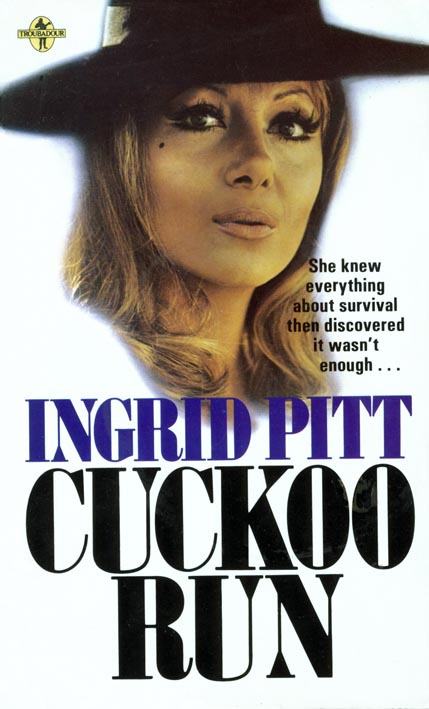
In 1999, her autobiography, Life's a Scream (Heinemann) was published, and she was short-listed for the for her own reading of extracts from the audio book.
The autobiography detailed the harrowing experiences of her early life—in a Nazi concentration camp, her search through Europe in Red Cross refugee camps for her father, and her escape from East Berlin, one step ahead of the Volkspolizei. "I always had a big mouth and used to go on about the political schooling interrupting my quest for thespian glory. I used to think like that. Not good in a police state."

Pitt died in a south London hospital on 23 November 2010, a few days after collapsing, and two days after her 73rd birthday, from congestive heart failure.

Seven months before she died, Pitt finished narration for Ingrid Pitt: Beyond the Forest (2011), an animated short film on her experience in the Holocaust, a project that had been in the works for five years. Character design and storyboards were created by two-time Academy Award-nominated filmmaker Bill Plympton. The film is directed by Kevin Sean Michaels; co-produced and co-written by Jud Newborn, Holocaust expert and author, "Sophie Scholl and the White Rose"; and drawn by 10-year-old animator, Perry Chen.
vimeo
#Ingrid Pitt#The Vampire Lovers#Countess Dracula#Academy Award#Anne Frank#Holocaust#Nazi#Where Eagles Dare#Kevin Sean Michaels#Hammer Films#The Wicker Man#The House That Dripped Blood#concentration camp#Stutthof concentration camp
122 notes
·
View notes
Text
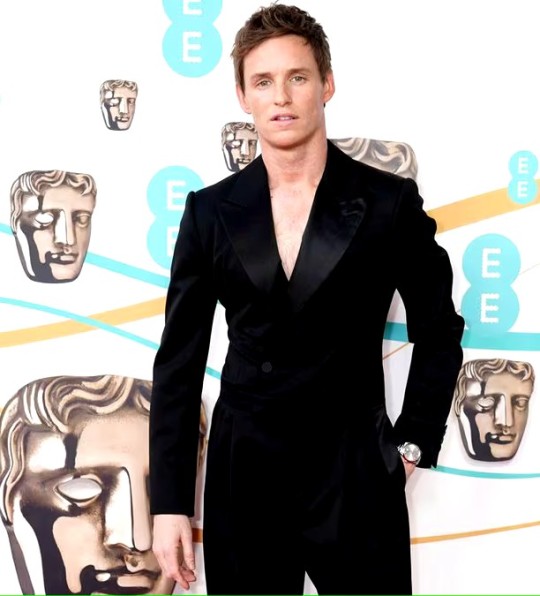
Eddie Redmayne lands Tony nomination for role in Cabaret.
(Excerpt) The actor already played the role of the Emcee in the West End.
Eddie Redmayne has been nominated for a Tony Award for his starring role in the Broadway production of Cabaret.
The British star has already won an Olivier Award for his turn as the Emcee in the hit show, which he first performed in London’s West End.
He is nominated for the best leading actor in a musical prize at the Tonys, alongside Brody Grant for The Outsiders, Jonathan Groff for Merrily We Roll Along, Dorian Harewood for The Notebook and Brian D’Arcy James in Days Of Wine And Roses.
The revival of the hit show first transformed the West End’s Playhouse Theatre into the Kit Kat Club and transferred to Broadway this month.
The show is still running in London, starring Luke Treadaway and Cara Delevingne.
Redmayne starred opposite Irish actress Jessie Buckley as Sally Bowles in London, but in New York the role is being performed by Gayle Rankin, who is nominated in the best actress in a musical category.
The nominations were announced on US morning show CBS This Morning.
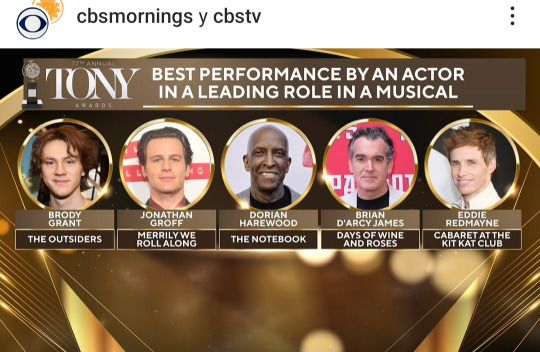
The 77th Tony Awards will be hosted by West Side Story actress Ariana DeBose on June 16 in New York.
6 notes
·
View notes
Text
Love in a Storm - Chapter 8
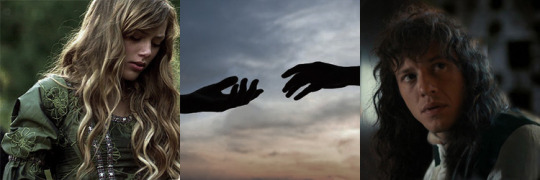
Pairing: Eddie Munson x Chrissy Cunningham (Regency AU)
Summary: A devastating loss threatens the happy marriage of Edward and Christine Munson, Lord and Lady Hurtsfield. However, when Edward is accused of a crime he didn't commit, Christine has to set her grief aside and embark on a perilous journey to prove her husband's innocence.
Warnings: childbirth, stillbirth, infertility, angst, false accusation, wrongful imprisonment, legal drama, some violence (non-graphic), some smut (non-explicit)
Chapter warnings: non-explicit sex
A/N: This was my first attempt to write a courtroom scene! I learned a lot during my research for it (such as the fact that British judges don't use a gavel). Also, the Old Bailey transcripts of the actual Cato Street Conspiracy trials are a Godsend, as I took a lot of Robert Adams' testimonies from them.
Chapter word count: 3.9k
Chapter 1 - Chapter 2 - Chapter 3 - Chapter 4 - Chapter 5 - Chapter 6 - Chapter 7
Chapter 8
The Old Bailey was so packed with spectators that the cab had to drop Christine and Owens a long way off from the main building, and Owens had to elbow his way through the crowd to get Christine inside. The pavement was swamped with boys selling broadsides printed with every detail of the conspiracy and the trials of the previous days. One of them ran up to Christine and offered her a pamphlet, and was met with such a withering glance from Owens that he ducked his head and quickly ran off.
The courtroom was a hive of activity, as clerks hurried back and forth on the floor below and spectators squeezed into their seats in the gallery above. A brief hush fell over the gallery as Christine sat down and removed her hood, revealing a velvet turban decorated with bright blue feathers. It was actually her mother's, left behind when she moved to Naples. Christine herself never wore something so flamboyant; she only wanted Edward to be able to pick her out amongst the crowd. A woman behind Christine huffed loudly, "With the money one paid for this seat, one would expect to see something!" Christine's cheeks burned, but she reminded herself she wasn't here to cater to the morbidly curious, who watched the trials as avidly as they did the latest drama in a West End playhouse. She was here for Edward. So she squared her shoulder and fixed her eyes on the floor below, ignoring the irritated murmurs around her.
The presiding judge was Lord Chief Justice Abbot, an old man with a stony, humorless face. Even from this distance, Christine could see the disapproval on the judge's face as he glanced at Murray, who looked more like an owl than ever in his crooked wig and gown. Before she could feel concerned about what this might mean for the trial, the murmuring rose again, and her attention was drawn to a door in a corner, where Edward was being led into the courtroom.
Christine leaned forward, hands gripping the banister in front of her, trying to take in everything about him, to fill that void he'd left in her during all those weeks they were apart. He was no longer in chains, thank God. And it looked like he had been shaved, washed, and changed into the clothes she'd sent. His hair was still too long, reaching his shoulders now, and he was thin, oh so thin! It wrenched her heart to see his features standing out sharply on his face and the dark smudges under his eyes. But at least he looked respectable, a gentleman. Hopefully, it would count for something in the eye of the jury. Even as she thought this, however, she was well aware that the other prisoners could not afford such privileges, and felt a jab at her conscience.
Edward was put to the dock. He turned toward the gallery and locked eyes with her. His mouth quirked up in that familiar smile that went straight through her heart. That smile told her everything that he couldn't say in his letters, everything that he couldn't speak in words. That smile said to her I'm here, sweetheart. Be brave. Be strong. I shall always be here. It was only for a brief moment, and then he turned to face the judge again, and Christine knew that look and that smile would have to sustain her for the rest of the trial.
The jury was sworn in, and the trial began. Christine hardly registered what was being said, so intent she was on watching Edward. He remained composed and expressionless while the Attorney General, a middle-aged man with a thin mouth and fussy manners, stated the case to the jury. He didn't look guilty or indignant. If Christine hadn't known him so well, she would've missed a slight hardening of his face, a tightening of his jaws, as the charges were read. He must be boiling with anger inside, and she was proud of him for maintaining a calm, dignified exterior.
The same could not be said for Murray. He moved about in front of the witness's box, waving his arms like a windmill and punctuating his questions with wild gestures. At first, Christine was exasperated by his theatrical performance, but as the witnesses stammered under his scrutiny, she started to understand his tactics. It was just as Edward had said; Murray sought to confuse the witnesses so he could catch them unawares and point out the holes in their testimonies. And he was witty, Christine had to give him that. More than once he set the crowd chuckling and had to be sternly reminded to stick to the procedures by the Lord Chief Justice.
After several witnesses had testified about the shooting of the police spy, Benson, and the fact that Benson had indeed been assigned to watch the Cato Street party, the star witness, Robert Adams, was called to the box. Despite knowing he was going to speak out against her husband, Christine couldn't help feeling sorry for him. He was a stooped, pitiful little man, with thinning, graying hair plastered to his head, a timid face, made all the more timid by the prominence of his ears, and the same vacant eyes as his wife's. In a small voice, he told of how the conspirators had found money to buy arms for their coup.
"Thistlewood said I might buy a pistol for 4 or 5 shillings; I said I had no money to buy pistols with, he said he would see what could be done. Later, he told me that there was a gentleman's servant who had supplied some of the party with money, and he said if they would act upon the subject he would give a great deal more. He repeated it more than once or twice." He said all this quickly, without emotion, as if by rote, confirming Murray's theory that he had been coached.
"Did you ever go with Thistlewood to get this money?" the Attorney General asked.
"No, but Thistlewood once came back from Hanover Square with the money, which he gave to Bradburn to purchase ferrules to put on the staves."
"Hanover Square, Lord Hurstfield's place of residence?"
A moment's hesitance, then Adams said, with a nod, "Yes."
"And did Thistlewood ever tell you the name of this servant or this gentleman?"
Adams shifted in his seat, saying, "I don't... I don't recall."
"Think, Mr. Adams. Such a generous gentleman, and you or any of the other men never thought to ask who he is, or why he would give you money to harm his own peer?"
Christine could hear displeased muttering amongst the crowd around her. Such a question, in any other case, could be seen as a clear example of leading the witness and the lawyer would be condemned for it, yet here the judge was turning a deaf ear.
Adams licked his lips. His eyes, like those of a frightened animal, flicked toward Edward, before he said, "Thistlewood might have said the name... Edward."
Christine shut her eyes briefly so she didn't have to look at the smug expression on the face of the Attorney General as he settled down, apparently satisfied with Adams's testimony. Now it was Murray's turn to cross-examine the witness.
"Are you sure it was Edward?" the barrister asked. "Not Munson, or Hurstfield, but Edward?"
"It might have been Edwards," Adams replied, looking a little more confident now that he no longer had to face the Attorney General.
"Are you not confusing him with George Edwards, a member of your party, who is now known to be a government spy placed amongst you to instigate—"
The Attorney General quickly stood up. "It has been confirmed that Mr. Edwards was nowhere near Cato Street on the night of the 23rd of February, and is not the subject of this cross-examination."
Murray spread his hands in a placating gesture. "Very well. Mr. Adams, could you confirm if it was Edward or Edwards?"
Adams's eyes darted to the prosecutors, as if seeking for a cue from them. "... It was Edward," eventually he said.
"Not Hurstfield or Munson?"
"I suppose he wouldn't be using his real name," Adams said.
"No, of course not!" Murray threw up his arms. "When coming up with a nom de guerre, one must always use one's Christian name!"
Christine couldn't stifle a grin. A snickering went round the courtroom. Adams looked abashed, knowing he'd stumbled, but unsure where or how.
"You mentioned seeing several pistols in the house of one of the prisoners, John Brunt, on the day of the 23rd," Murray continued. "Did you see this pistol amongst them?" He gestured to one of the clerks to show Adams the pistol bearing the Munson coat of arms.
Adams seemed even more confused. "I... I cannot say. They were all lying in a drawer. I cannot even say what their exact number was."
"Has Thistlewood ever mentioned the possibility of a police spy watching your movements?"
"He... he did tell us to watch out for the police," Adams said.
"And yet he missed the fact that George Edwards, his right-hand man, was a spy?"
"I must ask you again, sir, to focus on the subject of this questioning!" the judge shouted.
"Have you ever heard the name Frederick Benson?" Murray asked.
"... No," Adams said, sounding defeated.
Up in the gallery, Christine nodded with satisfaction. Murray was not only throwing doubt on Edward's involvement in the conspiracy, he was also pointing out that the shooting of Benson might have nothing with the conspiracy itself, killing two birds with one stone.
After that, Edward's character witnesses were called - Mr. Clarke, the Misses Hargrove, and some officials from parishes where Edward had done his reform work. It heartened Christine to see and hear them speaking so warmly of him. She could feel the mood of the crowd change as well, becoming more sympathetic, and for the first time in weeks, she allowed herself to hope.
At last, it was Edward's turn to deliver his defense. Usually, this would be done by the barrister on behalf of the prisoner, but Edward had elected to speak for himself. Christine's heart swelled with pride as he stood up and address the jury.
"My Lords and Gentlemen of the Jury," he began. "I cannot, nor do I want to deny that I am for reform." Christine cursed inwardly. Why in God's name would Edward open with that?! Such a statement wouldn't exactly be helpful to his case. Around her, the audience reacted with surprise as well, as heads bent toward each other in curious whispers. "I suppose you were expecting me to denounce it and proclaim my loyalty to the Crown. But I must be honest." Here, he glanced at the gallery, and his eyes caught Christine's for a moment. "I want changes. I don't want to live in a world where men can be hanged for trying to feed their families, mothers have no rights over their children, and orphans can be sold like cattle. But I also do not condone violence. I would like to believe that we can bring about changes by discovering our own sympathy for our fellow man, as well as by appealing to it in others, not by killing and inciting riots. Doing so would be to harm the very people I wish to protect. Whatever Mr. Thistlewood and his men were planning, I had no part in it."
Christine's initial irritation faded away as she looked upon her husband, who stood facing those who scorned him, who wished him harm, all because he dared to tell the truth, because he refused to conform to their rules. Her Edward, brave and true. In the past two years, between her grief and her loneliness and her frustration, she had allowed herself to forget what she loved most about him, his courage, his honesty, his passion for everything in life. It had taken all this trouble for her to remember it again.
But was it too late? For Christine had barely felt the elation when it was stamped out again, as cruelly as a bucket of water on a fire, by the Lord Chief Justice, who fixed his cold, colorless eyes on Edward, and intoned:
"As much as I would like to commend your compassion for the less fortunate, sir, the truth of the matter is that a man was killed. He was killed by your pistol, and you cannot account for your movements at the time of his death. Where was your compassion then?"
With that, he signaled for the court to adjourn. The grim faces of the judge and prosecutors brought back in Christine's mind what Murray had said. They have already decided... The trials are just for show... They will try to make an example out of him... Her heart plummeted as she realized it had all been for naught. Edward was a dead man even before he walked into the courtroom.
***
The Lord Chief Justice's foreboding words were still ringing in Christine's ears as she and Owens made their way out of the building. The trial was going to recommence the next day, but Christine wasn't sure if she could endure it, despite Murray's ever-present optimism, despite Mr. Clarke and the Hargrove sisters' encouragement.
"Don't mollycoddle me, Mr. Murray," she said, when she managed to snatch a moment with the barrister outside Old Bailey. "Tell me, truly, do you think his lordship has any chance of an acquittal at all?"
The barrister's usual sardonic smile disappeared. "Unless we can provide clear, irrefutable evidence of his innocence, I believe the best we could hope for is a reduced sentence."
"Transportation?" she asked, trying to keep her voice steady.
Murray nodded. The hollow feeling in Christine's chest grew. She didn't know what was worse, Edward dead or thousands of miles away in Australia. Perhaps she could accompany him. She had heard stories about prisoners successfully building new lives for themselves in the penal colonies... provided that they survived the hellish voyage there, of course.
Suddenly she felt a burning desire to see Edward, stronger than she had ever felt in the previous days. She had only had a glimpse of him in the courtroom as he looked back at her, before he was taken away again, back to prison, and now she longed for him, longed to put her head on his chest, longed to cry in his arms and hear him telling her that everything was going to be all right.
"Owens, please find us a cab to Coldbath Fields Prison," she said. When both men opened their mouths to protest, she held up a hand. "Gentlemen, I don't want to hear another word from you. This may be my last chance to see my husband before he is—" Her voice caught. She cleared her throat and stood up straighter. "My mind is made up. That cab, please, Owens."
"Yes, my lady." The butler tilted his head and went to the row of cabs parked down the road.
"He's still out there, you know," Murray said gravely. "And I can't pay my informants enough to have them accompany you to a prison."
"I'm taking Owens along," Christine said, her tone inviting no further debate. "I shall be perfectly safe."
***
Once the cab rolled to a stop outside the bleak walls of Coldbath Fields Prison, Christine instructed Owens to wait for her and went directly into the governor's office, as Murray had once taken her.
"This is most irregular, my lady," the governor protested, when she laid down her request.
"Sir, please. I simply wish for some time with my husband. He is... as good as a dead man." It took all of her courage to say those words out loud. She still didn't want to believe it. Somewhere in her heart, there was still a tiny flicker of hope, an irrational belief that some miracle would happen to save Edward. "Surely you wouldn't deny a grieving wife a chance to see her husband before he was executed?" And she put down a pouch full of coins on his desk.
The jingling of the coins did a lot more to soften the governor's expression than her entreating words. He picked up the pouch and undid the opening to peer inside, not even bothering to be discreet. The crease between his eyebrows immediately relaxed as if someone had taken an iron to it.
"Very well, my lady," he said. "The guards will take you to his lordship."
Christine followed the two guards down a long, narrow hallway, lined on both sides with heavily enforced doors, each containing only a tiny grated window that could be opened for food and other delivery. Her eyes burned from the smoke of the oil lamps swinging from the ceiling, and she shivered, partly from the cold dampness that seeped through the stone walls, partly from the eerie silence that hung over the place like a thick veil, muffling even the heavy treads of the guards' jackboots.
They finally came to a stop at one of the doors. "I would be very grateful if you could give us some privacy," she said, pressing a coin each into the guards' palms. "You can lock the door behind me. I shall let you know once I'm ready to leave."
The guards raised their eyebrows and glanced at each other, but Christine knew the coins would be too tempting for them to resist. "Much obliged, my lady," one of them said and unlocked the door.
Edward was sitting on the bed, with his elbows on his knees and his head in his hands. He looked up at the sound of the door opening.
"Christine? What are you doing here?"
Christine waited until the keys rattled behind her. She had no intention of breaking down in Edward's arms with these men listening outside. Only when the sound of the guards' footsteps faded away then she went to her husband and buried her face in his chest.
"I'm sorry. Don't scold. I had to see you before..." Before the last day of the trial. Before he could be found guilty and taken away from her forever, and the only time they were allowed to meet would be before his execution or departure for the penal colonies. Just for once, for this night, she'd like to see him without the shadow of the noose hanging over them.
"I won't scold. I'm glad you're here." He enfolded her in his arms, and for a moment, Christine allowed herself to not think of anything else but his safe, warm embrace, the feel of his broad, sturdy chest under her cheek, and the soft beating of his heart, while time stretched endlessly around them.
"Thank you for wearing this monstrosity, by the way," he said, removing her turban and tossing it on the table, so he could kiss her hair.
"I never thought it would come in handy," she said, smiling up at him.
"You weren't too worried today, were you, sweetheart?" he said. "I told you Murray would be magnificent."
Christine's heart melted. Edward must have known how the Lord Chief Justice's words affected her, but he was trying to ease her mind. Always thinking of her, always protecting her...
"I think you were magnificent," she whispered, nestling into him again.
"Was I? And here I thought you were going to scold me for giving another one of my reform speeches, when I should have been groveling to the judge instead."
"No. I expect nothing less from you. Truth conquers all, remember?"
She lifted her face to look at him, and he bent down to meet her with a kiss. She had expected it to be a quick, soft kiss, but the moment their lips met, all the longing she'd felt in the last two months erupted into a physical ache, a fire that refused to be quenched unless she had him in her arms. So she pressed her hands to his cheeks, drew him to her, and drank him in. Edward tightened his hold around her, and she writhed in his arms so she could feel all of him with all of her, his hands cradling her waist and the back of her head, his chest crushing her breasts, his lips a scorching heat between hers. Still, the fire burned. His mouth moved down her throat, and his hands impatiently opened her coat and tore away the lace fichu covering the low neckline of her bodice, until his trembling lips found their way to the upper swells of her breasts. The ache concentrated into a pounding in her heart and between her legs, echoed by a throbbing pulse she could feel from him, even through all the layers of their clothes.
With difficulty, she peeled herself away from him and threw her coat over the door of the cell, covering the small opening.
"What are you doing?" Edward asked, puzzled.
"Giving us some privacy," she said. "I've paid those guards well, but who knows when they may return."
She returned to him. As he realized her intention, Edward resumed his kisses with a frenzy. His lovemaking had always been gentle, shy, and unhurried, but there was none of that gentleness now in the way his mouth ravished hers, in the way he tugged at the buttons on the back of her bodice and stripped it down over her breasts. It was feral, frantic, driven by the fire she knew they both felt. They had so little time.
Her back hit the cold, hard wood of the bed, and she shivered, not because of the cold, but because his mouth had closed over her breast, inflaming, tormenting. She arched her back and twisted her fingers into his hair, pressing him closer to her, urging, begging for more. He pushed her skirts up around her waist, and the next thing she knew, he was inside her, the fabric of his trousers rubbing against her thighs, driving her mad with want. Still the fire burned, but she no longer wished to quench it. She wished for it to go on forever, until her very blood felt like it was built from crackling flames, until it obliterated everything so there was nothing else but the two of them, here, now. She wrapped her limbs around him, clinging to him with all her might, while her hips lifted rhythmically, matching his thrusts. The fire was close to burning out, but not yet, not yet, she didn't want to lose him just yet...
"Look at me, Edward," she whispered, wishing to draw out the moment just a little longer. "Please, look at me." And he did, his eyes filling her veins with warmth, with desire, with love. The fire reached its zenith. She bit into his shoulder to muffle a cry, half in ecstasy, half in despair, while he pressed his sweat-drenched forehead against her neck with a moan and poured himself into her, and finally, they became one, body and soul, as the fire burned itself out, sated at last.
Chapter 9

#hellcheer#eddissy#hellcheersource#hellcheer fic#hellcheer au#regency au#eddie munson#chrissy cunningham#eddie x chrissy#chrissy x eddie#joseph quinn#joseph quinn fic#eddie munson smut#joseph quinn smut#hellcheer smut
31 notes
·
View notes
Text
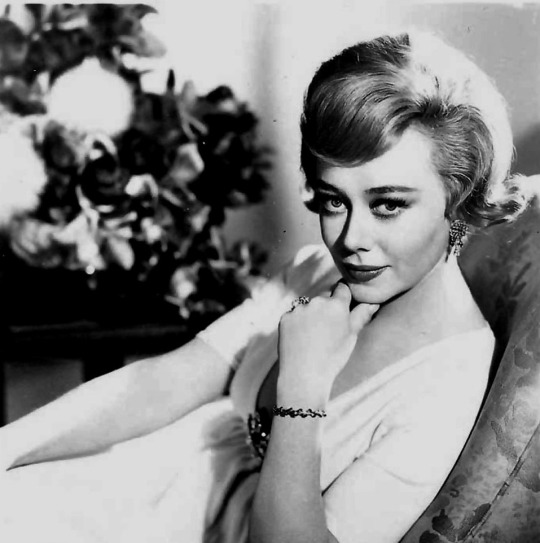
Glynis Margaret Payne Johns (October 5, 1923 - January 4, 2024) Film, stage and television actress, dancer, musician and singer. In a career spanning eight decades on stage and screen, Johns appeared in more than 60 films and 30 plays. She has received various accolades throughout her career, including a Tony Award, a Drama Desk Award, a National Board of Review Award, and a Laurel Award, in addition to nominations for an Academy Award, a Golden Globe Award, and a Laurence Olivier Award. She is widely considered as being one of the last surviving major stars from the Golden Age of Hollywood and classical years of British cinema.
Johns made her television debut in 1952 with Fletcher Markle's Emmy Award-winning series Little Women. She appeared in just one episode: season 4's "Lilly, the Queen of the Movies" as Lily Snape. Her television credits of the 1950s include brief appearances in the Hollywood anthology series Lux Video Theatre (in the 1953 episode "Two For Tea"), Errol Flynn's anthology series The Errol Flynn Theatre (in the 1956 episodes "The Sealed Room" as Lou McNamara and "The Girl in Blue Jeans" as The Girl Susan Tracey), CBS's anthology series Schlitz Playhouse of Stars (in the 1957 episode "The Dead Are Silent"), and ABC's variety and drama series The Frank Sinatra Show (in the 1958 episode "Face of Fear" as Christine Nolan)
Johns was cast in 1961 in the ABC/Warner Bros. crime drama The Roaring 20s. She portrayed Kitty O'Moyne, an Irish immigrant who falls overboard into the harbour as she arrives in the United States. Johns guest-starred in the CBS anthology seriesThe Lloyd Bridges Show in the episode "A Game for Alternate Mondays" of the 1962–63 television season, playing widow Leah Marquand, with Leslye Hunter as her daughter Isabella. On 5 August 1963, Vacation Playhouse premiered the episode "Hide and Seek" as the pilot of her eponymous CBS television series Glynis. The original working title for the series was The Glynis Johns Show; in it, Johns played the neophyte mystery writer and amateur sleuth Glynis Granvile. In the autumn of that year, Glynis officially premiered, starring Johns and Keith Andes as a married couple, Glynis Granville and Keith Granville, a criminal defence attorney. Due to pressure from NBC's The Virginian and Bill Cullen's The Price Is Right game show on ABC, the programme was cancelled after thirteen episodes. In 1965, when CBS reran the series as a summer replacement for The Lucy Show, Glynis ranked #6 in the Nielsen ratings. Johns remained busy on screen, appearing as Steffi Bernard in the episode "Who Killed Marty Kelso?" of ABC's detective series Burke's Law opposite Gene Barry. In 1967, she appeared in four episodes of the Batman television series as villainess Lady Penelope Peasoup, one half of the evil duo with Rudy Vallée as her brother Lord Marmaduke Ffogg.
During the first season of NBC's hit sitcom Cheers, Johns guest-starred as Diane Chambers' mother, Helen Chambers, an eccentric dowager who, due to a stipulation in Diane's late father's will, will lose all her money unless Diane is married by the next day. In 1985, Johns played Bridget O'Hara in the episode "Sing a Song of Murder" of CBS's crime drama television series Murder, She Wrote, working again with Angela Lansbury. From 1988 to 1989, she played Trudie Pepper, a senior citizen living in an Arizona retirement community, in the television sitcom Coming of Age, also on CBS. (Wikipedia)
8 notes
·
View notes
Text

La Chimera (dir. Alice Rohrwacher) x VIFF 2023.
A beguiling Josh O'Connor in a dirty white linen suit stars as a recently released from prison British archaeologist turned grave robber who stumbles into a European network of stolen Etruscan artifacts in 1980s Tuscany. It's a strange period romantic drama about obsession blending ideas of historical folklore and unattainable dreams in Italy's past and present.
Screening at the 2023 Vancouver International Film Festival as part of the Special Presentations series at the Vancouver Playhouse on Oct. 2.
#la chimera#chimera#viff#viff 2023#reviews#media#features#movie#movies#movie review#film#film review#cinema#josh o'connor#alice rohrwacher#italian film#tuscan#tuscany
12 notes
·
View notes
Text
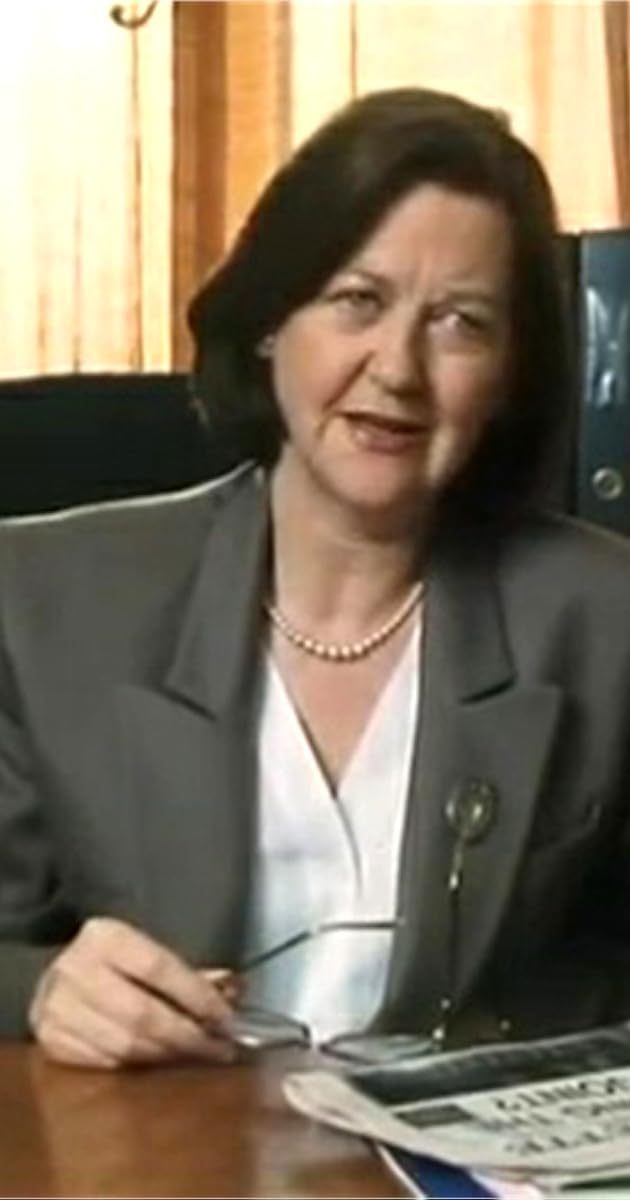

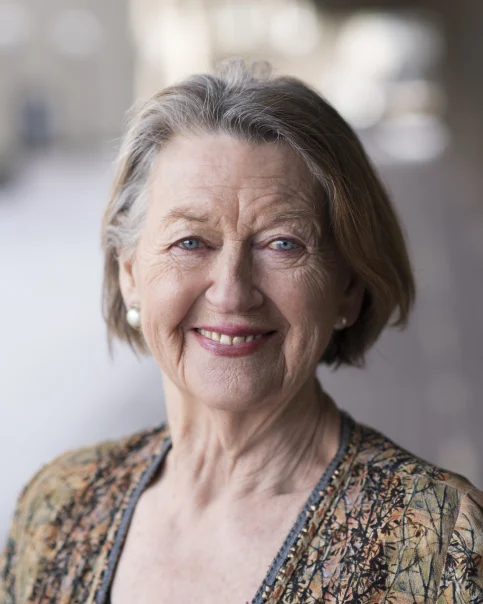

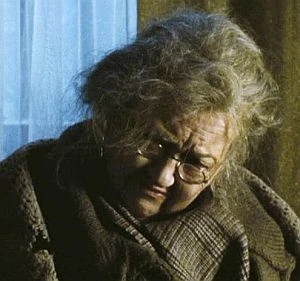
Happy Birthday Scottish actress Sandra Voe born on Shetland on 6th 1936.
Other than the fact she was born on Shetland, where her father owned a fishing factory, there is little I can tell you about Sandra’s early life. However she has been a very busy lady, appearing in many TV shows over the past 50 odd years Voe began her on screen career in 1966, appearing in an episode of Dr. Finlay’s Casebook.
Her shows in the 70’s include Coronation Street, Emmerdale Farm, Within These Walls and Sounding Brass, during the 80’s on TV and film, Bread or Blood, The Practice, Open all Hours and Local Hero, the 90’s saw her in the brilliant Takin’ Over the Asylum, which seems to crop up in a few of our anniversaries and another regular show on my posts Taggart, over into the 21st century and oor Sandra was still working hard, the pick of 15 different shows and films were Playing the Field, Midsomer Murders, Foyles War, and of course Monarch of the Glen .In 1993 she was also in the gritty film Naked, which also starred Ewan Bremner, Spud in the Trainspotting films.In the past 8 years Sandra Voe, now in her 70’s shows no sign of slowing down, Holby City, Howards end, in 2013, inevitably she turned up in her home Islands on the superb Shetland. Just this year Sandra has chalked up a couple of appearances on the hit series, Vikings as a witch
As well as the many, many TV and film roles she has also been a regular treading the boards at some of the top Theatres, including Sheffield Crucible, Leicester Phoenix, Leicester Haymarket, Oxford Playhouse, Birmingham Rep, Manchester Royal Exchange, West Yorkshire Playhouse, Nottingham Playhouse, Bristol Old Vic, Bloomsbury, Hampstead, Lyric Hammersmith, Almeida, Bush, Shared Experience, RNT, Royal Court and Ambassadors.
Her daughter, Candida Doyle, was keyboard player with the '90s British pop band Pulp, her son, Magnus Doyle, was Pulp's drummer. Sandra was last on our screens in the very good mini-series Trigonometry.
Recently Sandra has been reliving her Local Hero experience when she makes a return trip to the north-east for the 40th anniversary of the film. She has teamed up with fellow actors Jimmy Yuill, Jonathan Watson and Tam Dean Burn and met school children from Banff Academy and Fraserburgh Academy.
Sandra said: “It’s wonderful to be coming back. The place and the community is conjured up so well by Bill Forsyth that you really believe it.”
14 notes
·
View notes
Text
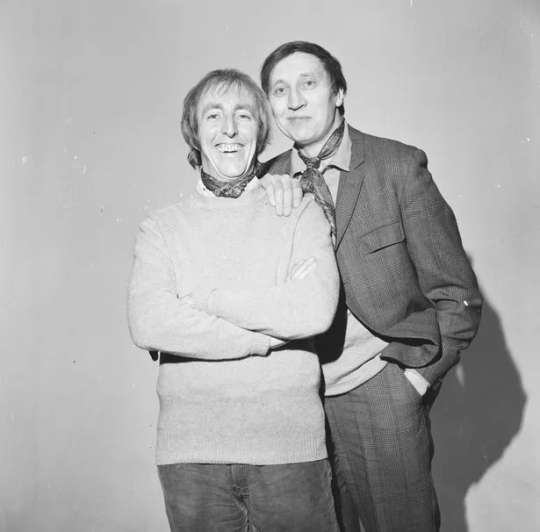


Remembering Stephen Lewis, merchant seamen turned actor and writer, who passed away August 12th, 2015.
Born in Poplar, East London, in 1926, he initially went to sea, before joining Joan Littlewood's Theatre Workshop, where he made his West End debut in The Hostage, by Brendan Behan, in 1958.
He wrote Sparrers Can't Sing, a play performed in broad cockney with significant improvisation, which was adapted as a feature film in 1963.

According to Variety:
"…The film is based on a play that (Joan Littlewood) staged at the Theatre Workshop. She and the author of the play, Stephen Lewis, collaborated on the loose screenplay and Littlewood surrounds herself with most of the Workshop cast. She also operates almost entirely on location in the East End that she knows and clearly loves so well…Much of the dialog, which is rather salty, appears to have been made up off the cuff of the players. This shows up dangerously in the intimate scenes, but gives gusto to others..."
Stephen Lewis later found lifelong fame as Blakey in LWT's On the Buses, on television and in three movie adaptations by Hammer, which went on to be some of the most profitable British feature films of the early 1970s. He wrote 12 episodes of On the Buses with co-star Bob Grant, as well their segment for the 1972 ITV Christmas special, All Star Comedy Carnival, and IMDb lists him as a contributing writer for the anthology series Armchair Theatre (Thames/ITV) and Comedy Playhouse (BBC).
He reprised the character of Blakey in the On the Buses spinoff, Don't Drink the Water (1974-75), with Blakey having retired to Spain with his sister, played by Pat Coombs.
He popped up on British television over the years with the occasional cameo, and appeared in David Croft and Richard Spendlove's Oh Doctor Beeching (1995-97), and in 135 episodes of Last of the Summer Wine.
Unlike Bob Grant, who struggled with the legacy of his On the Buses stardom and subsequent typecasting, with ultimately tragic consequences, Stephen Lewis happily embraced his persona to the very end...and beyond.
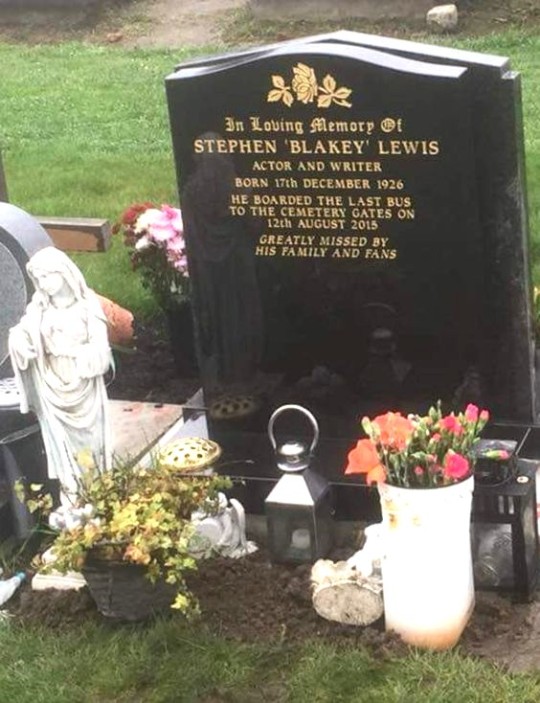
(This image: 70s Time Machine. Other Background from IMDb, Variety and The Guardian)
See also:
#social history#working class history#on the buses#london weekend television#british comedy#british television#british culture#classic tv#british theatre#british playwrights#british cinema
16 notes
·
View notes
Text
God, Operation Mincemeat is Brilliant! - Jen S
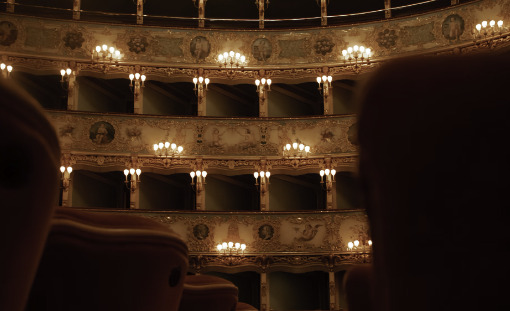
There’s a new show taking London’s West End by storm and what a show it is! Operation Mincemeat is a new musical by award-winning musical theatre makers, Natasha Hodgson, Zoë Roberts, David Cumming and Felix Hagan, collectively known as SpitLip. It follows the real story of a group working for British Intelligence who come up with an utterly wild strategy to trick Hitler and help win us World War ll. It’s fast-paced, silly and very, very funny – a perfect tone for such a farcical true story.
Having previously been performed at London’s New Diorama Theatre (2019) and Southwark Playhouse (2020, 2021, 2022), followed by an extended run at Riverside Studios (2022), this exciting new musical has made its way to the Fortune Theatre in the West End and is growing stronger every day. Opening on 29th March this year, the show has extended multiple times due to popular demand and is currently booking until 4th November.
Fans of the show are passionate, with some saying that they have seen the show 30+ times. This has led to Operation Mincemeat now offering a Loyalty scheme to show their appreciation for the support. If you have seen the show multiple times, you can head over to the Operation Mincemeat website and fill in a form to apply for £10 off per ticket for a group of 6 or more patrons (subject to availability.)
This is one of the things which makes me so happy for the creators of Operation Mincemeat – they care about their audience. When creating the show, as far back as 2018, they uploaded videos of what they were working on, to their SpitLip YouTube channel, asking for feedback on their working progress songs and sharing with their audience, challenges they were facing with the making of Operation Mincemeat. This is all content which isn’t usually shared, as creatives often like to keep things on the down-low until they are fully happy with their work. SpitLip, on the other hand, are collaborators and when watching Operation Mincemeat, I was struck by how much I felt that in the theatre.
I’ve tried to express what I mean to friends and family, but Operation Mincemeat just feels different. When watching it, I felt like I was as much a part of the show as I was watching the show. The atmosphere in the theatre was nothing but positive, with audience members around me spilling compliment after compliment about how original and creative the show is. With a cast of only five actors, something else which is special for this show is the fans’ support and enthusiasm for the understudies. Unfortunately, in theatre, there can be negativity towards understudies generally, when an audience member attends the show expecting to see a particular actor, but they see an understudy instead. Not at Operation Mincemeat. Fans are so supportive of every cast member that a bingo sheet has been created, so that fans who see the show multiple times can tick off the different combinations of cast members they have seen perform together.
I have seen the main original cast in the show (Natasha Hodgson, Zoë Roberts, David Cumming, Claire-Marie Hall and Jak Malone) twice (so far) and both times, something went awry. Of course, in live performance, things can go wrong at any time, but the important thing is how the actors react and I felt truly honoured to witness how they dealt with it.
At my first viewing, it was just a simple misthrow of a hat. Not a big deal – they just threw it again and moved on. My second viewing, however, saw something which I loved with all my heart – probably the greatest moment I’ve ever seen in a theatre. Three actors were on-stage (Natasha Hodgson, David Cumming and Claire-Marie Hall), their characters having a discussion, when suddenly, Hester (Jak Malone) swung the door wide open, loudly and confidently making their entrance. The three looked at Jak. Jak looked at the three. Natasha broke the silence, “you’ve come in a bit early, Hester, I think.” The audience were suddenly beside themselves, realising that Jak had mistakenly entered the scene too early and we all watched as he slowly backed away, closing the door behind him. The three continued where they left off, only to be greeted by Jak re-entering a few lines later from the wrong entrance. Natasha, “there isn’t even a door there.” It was utterly hilarious and I was nothing but impressed by how the actors dealt with the situation. This is a funny musical and that was a naturally funny moment, so why not use it? The audience’s laugh was nothing but supportive and only brought us closer to the piece. It was a rare genuine moment in theatre, where the actors were just playing and what a breath of fresh air it was.
Another breath of fresh air, was my experience meeting the cast. Typically, I don’t go to stage doors after shows any more, partly because I don’t want to take up their time when they’re tired and busy. On this day, however, I was meeting a friend after the show, who was running late and as I was standing close to the stage door, the cast started coming out. I figured that this would be a natural opportunity to tell the cast how much I loved their show and I cannot tell you how impressed I was by the experience. Despite having less than two hours between their matinee and evening shows, the cast took as much time as was needed to speak to everyone personally, signing programmes and chatting about the show. It was the most chilled, personal stage door experience I’ve ever had, with actors who were nothing but grateful that people wanted to share how much the show meant to them. They were a great group of people and I even had the extra joy of meeting Jak’s Italian Greyhound, Dracula.
Every time something good comes their way – an extended run or yet another 5-star review - it brings me such joy, knowing that a group of friends who made their own musical have seen it go from strength to strength. It’s so rare that happens and I am truly thrilled for them. I can only hope that it’s around for many years to come – I’ll be cheering them on all the way.
Treat yourself to Operation Mincemeat tickets and have a great day!
9 notes
·
View notes